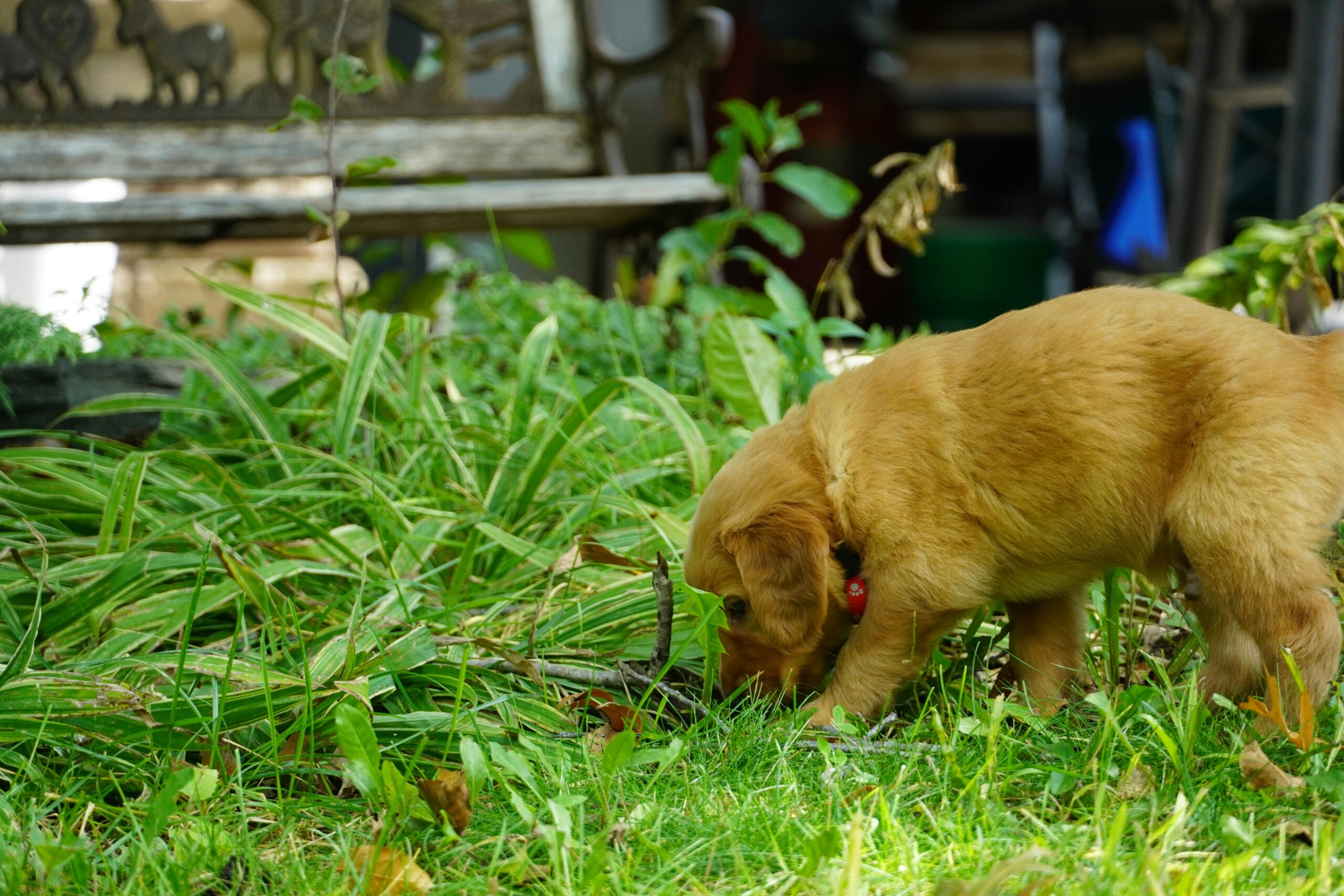

Have you ever caught your puppy nibbling on grass during a walk or playtime in the yard? If so, you’re not alone. This curious behavior is surprisingly common among puppies and adult dogs alike.
Let’s dive into everything you need to know about why your puppy might be munching on grass, including expert insights from Dr. Stephanie Liff, Lemonade’s favorite vet.
Why do dogs eat grass?
If you’re wondering, “Why does my dog eat grass?” you’re asking one of the most common questions among dog owners. Here are some possible reasons behind this behavior:
They’re exploring their environment
Puppies are naturally curious and love to investigate the world using their mouths. Chewing on grass might just be part of how they learn about their surroundings.
Digestive aid for an upset stomach
Some dogs eat grass to soothe or relieve an upset stomach. “If it leads to vomiting, they’re often trying to self-soothe ” Dr. Liff explains. Grass may help induce vomiting to relieve nausea—but this shouldn’t happen regularly. If it does, consult your vet.
Nutritional deficiency
A nutritional deficiency in your dog’s diet might lead to grass-eating. If your puppy isn’t getting enough fiber, they might eat grass to fill the gap. Look for puppy foods with fiber-rich ingredients like pumpkin or sweet potato. You can also add small amounts of plain canned pumpkin or ask your vet about fiber supplements to help support digestion.
Instincts from wild dogs
Did you know that wild dogs are omnivores? They consume both meat and plants as part of their natural diet. This instinctual behavior may explain why your puppy finds the taste of grass appealing.
Boredom or mental stimulation
Sometimes, grass-eating is simply a sign that your puppy is bored. Puppies need plenty of playtime and enrichment to stay engaged. If they’re not getting enough mental stimulation or physical activity, they might turn to grass as an outlet.
Stress or anxiety
In rare cases, grass-eating might be a coping mechanism for stress or anxiety. If your puppy is feeling overwhelmed, this repetitive behavior could be their way of self-soothing.
They like the taste of grass
Finally, your puppy might just enjoy the taste or texture of grass. Some dogs find it appealing, much like how they might have a favorite treat or chew toy.
Should I be worried about my dog eating grass?
Dr. Liff wants to assure pet parents that most of the time, grass-eating isn’t something to worry about:
It’s not really a health issue for your puppy to eat grass, unless the grass is treated with chemicals like herbicides or pesticides.
Dr. Stephanie Liff
Ingesting treated grass can be harmful, so avoid letting your pup graze in sprayed areas. If your puppy is eating large amounts of grass, vomiting frequently, or showing other symptoms—like diarrhea, lethargy, or appetite loss—it’s time to talk to your vet.
What should I do if my puppy has an upset stomach?
If you suspect your puppy is eating grass because they have an upset stomach, here are a few steps you can take:
- Monitor their behavior: Keep an eye on how often your puppy eats grass and whether it leads to vomiting or other signs of illness. Occasional vomiting might not be a concern, but frequent episodes could indicate an underlying issue.
- Check for intestinal parasites: While not usually the direct cause of grass-eating, intestinal parasites like hookworms or giardia can upset your puppy’s stomach. Your vet can run a simple fecal test to check for parasites and recommend treatment if needed.
- Provide a high-fiber diet: A high-quality diet with adequate fiber can support your puppy’s digestive health and reduce their need to seek roughage elsewhere.
Before we go…
Grass-eating is a common behavior in puppies and dogs, and most of the time, it’s nothing to worry about.
And remember, protecting your puppy with pet insurance is just as important as providing the right care. With Lemonade’s pet insurance, you can stay ahead of unexpected vet visits and help your pup stay healthy as they grow, play, and explore their world.
FAQs
A few quick words, because we <3 our lawyers: This post is general in nature, and any statement in it doesn’t alter the terms, conditions, exclusions, or limitations of policies issued by Lemonade, which differ according to your state of residence. You’re encouraged to discuss your specific circumstances with your own professional advisors. The purpose of this post is merely to provide you with info and insights you can use to make such discussions more productive! Naturally, all comments by, or references to, third parties represent their own views, and Lemonade assumes no responsibility for them. Coverage and discounts may not be available in all states.



